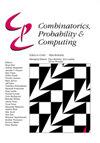Card guessing with partial feedback
IF 0.8
4区 数学
Q3 COMPUTER SCIENCE, THEORY & METHODS
引用次数: 15
Abstract
Consider the following experiment: a deck with m copies of n different card types is randomly shuffled, and a guesser attempts to guess the cards sequentially as they are drawn. Each time a guess is made, some amount of ‘feedback’ is given. For example, one could tell the guesser the true identity of the card they just guessed (the complete feedback model) or they could be told nothing at all (the no feedback model). In this paper we explore a partial feedback model, where upon guessing a card, the guesser is only told whether or not their guess was correct. We show in this setting that, uniformly in n, at most $m+O(m^{3/4}\log m)$ cards can be guessed correctly in expectation. This resolves a question of Diaconis and Graham from 1981, where even the $m=2$ case was open.有部分反馈的猜牌
考虑以下实验:随机洗牌一副牌,其中有n种不同类型的m张牌,猜测者试图在抽到牌时按顺序猜牌。每次做出猜测时,都会给出一定数量的“反馈”。例如,一个人可以告诉猜测者他们刚刚猜测的卡的真实身份(完整的反馈模型),或者他们可以什么都不告诉(无反馈模型)。在本文中,我们探索了一个部分反馈模型,在猜测一张牌时,猜测者只被告知他们的猜测是否正确。在这种情况下,我们证明,在n中,最多$m+O(m^{3/4}\log m)$张牌可以在期望中猜对。这就解决了Diaconis和Graham在1981年提出的一个问题,即即使$m=2$的情况也是开放的。
本文章由计算机程序翻译,如有差异,请以英文原文为准。
求助全文
约1分钟内获得全文
求助全文
来源期刊

Combinatorics, Probability & Computing
数学-计算机:理论方法
CiteScore
2.40
自引率
11.10%
发文量
33
审稿时长
6-12 weeks
期刊介绍:
Published bimonthly, Combinatorics, Probability & Computing is devoted to the three areas of combinatorics, probability theory and theoretical computer science. Topics covered include classical and algebraic graph theory, extremal set theory, matroid theory, probabilistic methods and random combinatorial structures; combinatorial probability and limit theorems for random combinatorial structures; the theory of algorithms (including complexity theory), randomised algorithms, probabilistic analysis of algorithms, computational learning theory and optimisation.
 求助内容:
求助内容: 应助结果提醒方式:
应助结果提醒方式:


